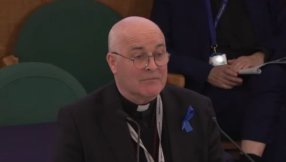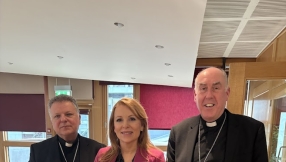
Widespread belief in the resurrection of Jesus is an opportunity for the Church, a missiologist has said.
Findings from the Talking Jesus Report published last year revealed that 45 per cent of the UK population believe in the resurrection of Jesus Christ and according to the people behind the report, that statistic should be encouraging news for churches as it can serve as a stepping stone for evangelism and conversations about faith within the wider community.
Dr Rachel Jordon-Wolf, Executive Director of HOPE Together, told church leaders gathered for The Briefing in London on Thursday that the resurrection is "key" and "a lot of people have some level of belief in it and we have to help them with that".
The insightful Talking Jesus research project was initiated in 2015 and is the joint initiative of HOPE Together, Christian Vision, Alpha, Kingsgate, Luis Palau and the Evangelical Alliance. The aim of the project is to analyse the nation's views on Jesus, Christians and evangelism, and the findings for the report are drawn from surveys spanning four thousand adults across the UK.
The 2022 report found that 6 per cent of Christians are "active" and "part of a worshipping community", a figure that has been stable since 2015 and, according to Dr Jordan-Wolf, is proof that "the Church is not in decline" and that "there is not a missing generation in the Church".
Results from the Talking Jesus Report have made an impact in churches and their strategies for evangelism and missions.
There is now a Talking Jesus Course to equip people with greater confidence to share Jesus and an 'evangelism healthcheck' for churches to self-audit their members and communities so that they can plan ways to grow stronger in their personal and corporate evangelism and witness.
Rachael Heffer, head of mission at the Evangelical Alliance, encouraged churches to "befriend non-Christians in new spaces and places" and "be brave and intentional to share nuggets of faith in their everyday lives and places they inhabit".
And churchgoers are being prompted not just to talk about church or God, but to use the name of Jesus in their conversations.
"When we share Jesus together, we are modelling what it is for the Church to be one body," said Andy Frost, Director of Share Jesus International. He continued: "When people see the Church working as it should do it's attractive."
According to Heffer, non-Christians have been seeking hope in the midst of Covid, political instability, and the cost of living crisis. And church leaders, she said, are being "further awakened" to the fact that people are asking "big questions of life and purpose" and are "made more aware of their own mortality".
According to Dr Jordan-Wolf, 10 per cent of practising Christians in the UK are to be found in London. She called on churches in the capital to make the most of that.
"Ten per cent of any population is enough to change the culture," she said.
"We need to remember we are a culture-shaping movement. We have more openness than anywhere else in the country.
"We have got to get our act together to do this together. If we do this together we can make an enormous difference."













